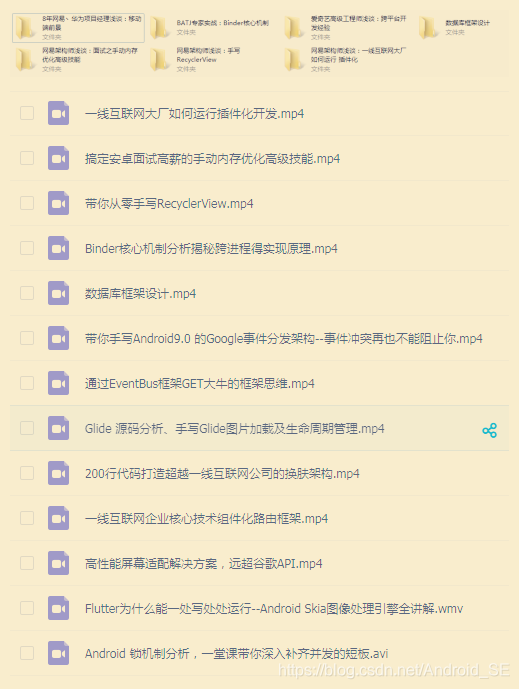Outline
Say gold, three silver and four bronze Fifth, these programmers month is the best time to quit, it also changed jobs early April. Many saw before looking for a job interview questions, review the information, but found that pure look face questions is not enough, because the back of the mind is not strong things, requires knowledge into the system before they can, so I put together a syllabus review, covering Android in the interview senior necessary knowledge, I hope this article can help some friends wanted to change jobs better review, prepare for interviews.
This article only set out the syllabus, as to the details of each module, a lot of information online, self-inspection, the order will have time to put some information to see when I review, this review up more knowledge into the system more efficiently.
A, Java-related
1. container (HashMap, HashSet, LinkedList, ArrayList, arrays, etc.)
Need to understand the implementation principle, but also flexibility, such as: to achieve their own LinkedList, two stacks achieved a queue array to achieve stacks, queues implement stack and so on.
2. Memory Model
3. garbage collection algorithm (the JVM)
4. class loading process (need to look at, focusing on understanding, more important for hot fixes and plug-in technology)
The reflector
6. multithreading and thread pool
7. HTTP, HTTPS, TCP / IP , Socket Communications, four three-way handshake procedure waved
8. design pattern (six basic principles, design patterns commonly used items, and the like handwritten singleton )
9. HTTP
Two, Android base
1. Custom View
2. Event Interception distribute
some performance issues 3. solved, the actual use in the project.
4. Performance optimization tools (TraceView, Systrace, debug GPU overdraw & GPU rendering mode analysis, Hierarchy Viewer, MAT, Memory Monitor & Heap Viewer & Allocation Tracker , etc.)
5. Performance Optimization
(1) Network: API optimization, traffic optimization, weak optimization
(2) memory: OOM processing, memory leaks, memory test, analysis, Bitmap optimization
(3) drawing (4) power: WeakLock mechanism, JobScheduler mechanism (5) APK thin (6) memory jitter (7) memory leak (8) Caton (9) performance optimization: layout optimization, excessive rendering process, ANR processing, monitoring, buried, Crash upload.
6.IntentService Principles and Applications
7. caching how they implement (LRUCache principle)
8. graphic images related: OpenGL ES pipeline process, understanding of EGL, Shader related
9.SurfaceView, TextureView, GLSurfaceView difference and usage scenarios
10. The animation, the difference , a estimator
11.MVC, MVP, MVVM
12.Handler, ThreadLocal, the AsyncTask
13.Gradle (Groovy syntax, Gradle plugin development foundation)
14. hot fix, plug-in technology
三、Android Framework
1.AMS, PMS
2.Activity start the process
3.Binder mechanism (IPC, AIDL use)
4. Why Parcelable, what benefit is that?
5.Android image display related processes, Vsync signal, etc.
Fourth, the tripartite Source
1.Glide: load, cache, LRU algorithm
2.EventBus
3.LeakCanary
4.ARouter
5. Plug of (the principle of different plug-in mechanism and genre, advantages and disadvantages of limitations.)
6. Hot Fix
7.RXJava
8.Retrofit
Fifth, algorithms and data structures
1. Single chain : inversion, insertion, deletion
2. doubly linked list : Insert, Delete
3. handwritten common sort, merge sort, heap sort
4. binary preamble, in sequence, after traversing
5. Maximum K problem
6. breadth , depth-first search algorithm
7. can go to swipe LeetCode , to elevate themselves will be relatively large.
Simply make a classification of five categories above, I hope there is no target readers can look to their own specializes in the sector, moving in the right direction
The address to pick:
https://shimo.im/docs/GsAQFU7wwBAQSJ4T/read

